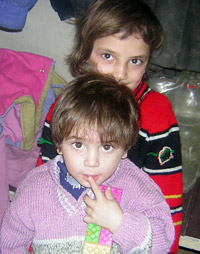During the time when the RA Minister of Finances Vardan Khachatryan was answering to the journalists’ questions and after giving a report to the Prime Minister, we became very optimistic about poverty reduction. “The level of poverty has reduced by 3.9% and amounted to 39%”, the report reads. However, when we compare those figures with what we see around we find ourselves in a very chaotic situation. The more poverty is reduced the more often we meet beggars on the streets. And then you draw a conclusion that the corresponding bodies are more concerned about presenting low indexes rather than curtailing poverty rates. This means that thousands of poor people are only X points for our authorities, rather than human beings.
Armenians have been proud of their national dignity for years, but today as a victory they state that we are supposed to receive over $230 million from the “Millennium Challenges” Corporation. The mentioned corporation gives this money only to the poorest countries of the world. Are we all asking for mercy? Yes. But we ask in a very shy way. The most terrible thing is that the corporation is still discussing whether we deserve that money or not because we have failed to conduct democratic elections and we are not a democratic state.
The $20 million-loan, given to Armenia by the World Bank, is also considered an achievement. This loan is directed to curtailing poverty in the country and is given for a 40-year period. The amount should be included in the State Budget and will be spent within the framework of the National Strategic Plan of poverty reduction. Furthermore, Holland has also given us a grant in the amount of $4.7 million.
It seems like everybody is worried about reducing poverty in our country. How about us? So are we. But it would be more correct to say that we are more worried about pretending rather than worrying in fact. If the grantor realizes that he is spending his money for no good reason, he won’t give us money any more.
But how can we show that we are doing something? True, we should show indexes that we are reducing poverty. There is a very good method for that. Poverty is assessed based on the consumption basket. There is a calculation of what minimal services the person needs for a normal life and the amount is compared with incomes. If the incomes are lower than the price of the consumption basket, this means that the person is below the poverty line.
Products and services included in the basket have a number of natural traits – their prices rise all the time. Therefore, the price of the consumption basket rises as well. If the price of the consumption basket rises and the incomes stay the same, it means that poverty is increasing.
What is happening in our country? They announce that wages are raised. At that, this publicity is done in such a hidden way that people cannot figure out how much their salary has raised. No one can deny that the increase of wages doesn’t change things too much. People mainly make a living by other sources rather than the state budget. People primarily take in international monetary transfers from their relatives who live abroad. And by considering the fact that the US dollar rate has fallen, it becomes even harder to show that poverty rate has reduced. Something else must be done.
But what can be done? There is only one answer. What is needed to be done is what the National Statistics Service (NSS) and World Bank do. They show a very low decrease.
You can see the index of consultation prices of 2005 by visiting the official NSS website. By visiting their site you will be very surprised to find out that, as of late December 2005, our consumption price amounted to 100.6. That is – compared to 2004 the price was raised by only 0.6%. By looking at the graphic we may presume that the prices have decreased in a stable way.
Index of Consumption Price in RA
(January-December, 2005 compared to the same period, 2004)
January 104.9
February 104.8
March 104.4
April 103.6
May 102.9
June 102.3
July 101.5
August 101.1
September 100.9
October 100.8
November 100.7
December 100.6
We have adverted to this graphic in previous releases of “168-Hours”. Any RA citizen, who does shopping at least a few times a year, will hardly believe those indices. That is communication (telephone and telegraph). This index amounted to 97. This means that within 2005 the fees of the communication service according to the consumption prices reduced by 3%.
The outcome of all this is that the consumption basket has slightly changed, which cannot negatively affect the poverty index. A very famous man once said, “There is a lie, a greater lie and statistics”. However, everybody has the right to believe statistics or seeing to believe. It just becomes evident that everything happens for a reason.

